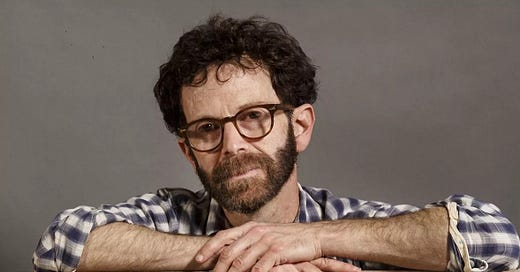Say who you are
“Say who you are.” It stuck with me and has stayed with me to this day. It goes back to something the inimitable Charlie Kaufman said at a BAFTA screenwriting lecture.
Perfectly in keeping with his films, Charlie Kaufman’s lecture was like no other. Quirky, angst-ridden, uncomfortable, insightful, open - and deeply vulnerable.
He began his talk by sharing that he’d never given a speech before, and that fact was the very reason why he chose to do it. He said, “I wanted to do something that I don’t know how to do, and offer you the experience of watching someone fumble, because I think maybe that’s what art should offer. An opportunity to recognize our common humanity and vulnerability.”
If you’re a member of the screenwriting world, you might know it. Then again you might have been busy writing, like this here dude. Never watched it until last night and I can assure you, it is 40+ minutes exceedingly well spent.
Watch it or read it (links below) and enjoy time you’ll be spending in Charlie Kaufman’s unusual world. I’m no Charlie Kaufman, most of us aren’t. Most working screenwriters are good at their craft, they deliver good work and that work, sometimes, turns out to be above average. Most of us are, let’s face it, nowhere near unique, and that’s just fine. There’s value in being ourselves, and it’d be foolish to try to emulate Kaufman, or Sorkins, or Mamet. But we can be ourselves, our vulnerable selves, and we can work with that, we can share that, with can say who we are in our life and in our work.
Below I’m highlighting some of the things Kaufman shared in the lecture. But please, whether you’re a screenwriter or not, take the time to listen to (or read) Charlie Kaufman’s ruminations.
I think we try to be experts because we’re scared.
“I don’t know anything. And if there’s one thing that characterizes my writing it’s that I always start from that realization and I do what I can to keep reminding myself of that during the process. I think we try to be experts because we’re scared; we don’t want to feel foolish or worthless; we want power because power is a great disguise.”
Your writing will be a record of your time.
“Say who you are, really say it in your life and in your work. Tell someone out there who is lost, someone not yet born, someone who won’t be born for 500 years. Your writing will be a record of your time. It can’t help but be that.”
The world needs you at the party starting real conversations.
“The world needs you. It doesn’t need you at a party having read a book about how to appear smart at parties – these books exist, and they’re tempting – but resist falling into that trap. The world needs you at the party starting real conversations, saying, ‘I don’t know,’ and being kind.”
It’s a step into the abyss.
“A screenplay is an exploration. It’s about the thing you don’t know. It’s a step into the abyss.”
We’ve been conned into thinking there is a pre-established form.
“There’s no template for a screenplay, or there shouldn’t be. There are at least as many screenplay possibilities as there are people who write them. We’ve been conned into thinking there is a pre-established form.”
I think you need to be willing to be naked.
“I think the danger of craft is that it needs to be in second position to what it is that you’re doing. It’s seductive to put it in first position, often because what you’re doing is meaningless or worthless, or just more of the same. So you can distinguish yourself by being very, very good at it. I think you need to be willing to be naked when you do anything creatively in film or any other form.”
What I have to offer is me, what you have to offer is you.
“I can’t tell anyone how to write a screenplay because the truth is that anything of value you might do comes from you. The way I work is not the way that you work, and the whole point of any creative act is that. What I have to offer is me, what you have to offer is you, and if you offer yourself with authenticity and generosity I will be moved.”
Straight to the lecture and the transcript









Thank you Daniel for this insight not only into sceenwriting but into being a person. Happy to hear you moved to the US. Best, Martin
What does he mean when he say, “I think the danger of craft is that it needs to be in second position to what it is that you’re doing. It’s seductive to put it in first position,”